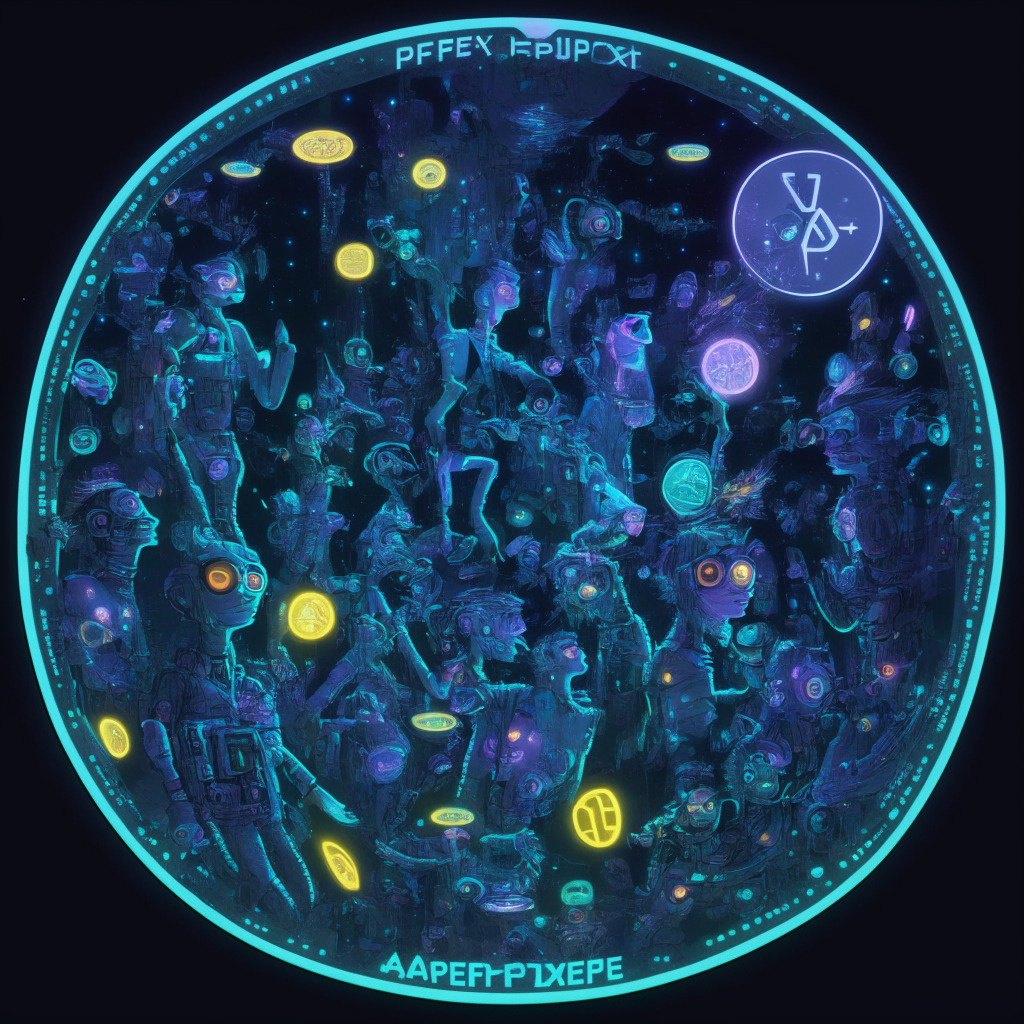Investment firm VanEck is set to launch the ‘VanEck Ethereum Strategy ETF’ (EFUT), targeting investments in standard ETH futures contracts. Despite concerns about market manipulation hindering approval for spot ETH ETFs, EFUT’s futures-focus might find easier SEC endorsement due to its less volatile approach. The future of ETH futures ETFs, however, remains uncertain.
Search Results for: CER
Navigating the Rise of Ethereum Futures: ETFs, Regulatory Hurdles, and Market Uncertainties
“VanEck plans to launch an ETF based on Ethereum futures contracts, a move that could capitalize on burgeoning interest in cryptocurrency investment vehicles. Despite SEC uncertainties, strong market interest and potential investment opportunities persist in Ethereum futures and other altcoins like Biconomy, Bitcoin Minetrix, and LeverFi.”
Invalid Block Mining: A Fluke or Cause for Concern in Blockchain Innovation
“Marathon Digital, a Bitcoin miner, inadvertently mined an invalid block due to a bug during an internal experiment. Critics argue this shows the danger of conducting risky experiments on live blockchain networks. However, experts argue this incident illustrates the robust security features of the Bitcoin network, which successfully regulated the anomaly.”
The Brewing Storm: Ethereum Futures ETFs Prepared to Surge Amid US Government Shutdown Concerns
Bloomberg analysts forecast the rollout of Ethereum futures exchange-traded funds (ETFs) as early as next week. Various competing entities in the crypto market plan to launch their own Ether futures ETFs, increasing market competition. However, not all proposed ETFs are expected to succeed due to the competitive nature of crypto markets. This Ethereum futures ETF launch now relies on the potential US Government shutdown.
Crypto Regulatory Suspense: SEC’s Stance, Stakeholder Worries, and an Uncertain Future
“The U.S. House Financial Services Committee may subpoena the SEC over undisclosed documents related to FTX’s former CEO. The Committee claims the SEC’s lack of cooperation is compromising transparency and hindering digital asset ecosystem growth. This case demonstrates how regulatory bodies are scrutinizing the digital asset industry.”
Blockchain Storms the Cricket Pitch: Pros, Cons and Uncertainties about the 2023 World Cup Initiative
“The International Cricket Council (ICC) will use NEAR’s Blockchain Operating System for fan engagement during the 2023 Cricket World Cup. This blockchain-based method promises personalized experiences for fans, but requires technological understanding and constant updates to operate smoothly. This move further showcases NEAR’s interoperability capabilities.”
CIA’s Shift to AI: Advancements in Investigation or Privacy Concerns Waiting to Unfold?
The Central Intelligence Agency (CIA) plans to utilize a custom-built AI tool to optimize investigative techniques by sifting through public information. Despite enhancing efficiency, this shift to AI technology raises concerns about the source of the AI model, information reliability, and data privacy issues. The development implies a significant change in the public sector’s approach to data interpretation.
Rising Tides: SPX6900 Token Soars Amidst Uncertainty, But Is Meme Kombat The Better Bet?
“SPX6900, named after the SPX index, is gaining substantial traction in the crypto market. Despite the prevailing uncertainty in financial markets, it has proved tantalizing for crypto traders. Meanwhile, Meme Kombat, a blend of gaming and decentralized Web3 platform, is also emerging as a promising contender. With transparent, AI-driven experiences, it’s capturing investor attention. However, as always, prudence is crucial in high-risk crypto trading.”
Bitcoin Market Uncertainty: SEC’s Decision Impact & Prospective Blockchain Future
Bitcoin’s slight dip in value, resulting from the SEC’s postponement on Ark 21Shares Spot Bitcoin ETF verdict, is causing a market-wide slowdown. However, Bitcoin’s blockchain’s achievement of over 900 million transactions and Microstrategy’s investment have revitalized the market. Additionally, an upliftment of interest rates by the Federal Reserve may provide a promising outlook on Bitcoin’s future.
Bitcoin Ordinals: Evaluating Impact on Network Efficiency Amid Rising Concerns
“The recent rise of Bitcoin Ordinals, a data inscription system, has raised concerns about network clogging and its impact on higher-value transactions. Contrary to this belief, a report by Glassnode found that inscriptions only occupy a fifth of Bitcoin’s transaction fees, indicating efficient blockspace use rather than significant displacement. However, Bitcoin Ordinals have amplified the demand for blockspace and operation costs for miners, potentially challenging miners’ profitability.”
Crypto Influencer’s Legal Woes: A Wake-up Call for Blockchain Community Responsibility
Crypto influencer Ben “BitBoy” Armstrong faced charges of loitering/prowling and simple assault, causing a stir in the crypto community. This highlights the importance of influencers acting responsibly and complying with the law, irrespective of their online clout in the crypto world.
Argentinian Oil Giant Tecpetrol’s Novel Crypto Mining Approach: Opportunities and Concerns
Argentinian oil producer, Tecpetrol, plans to use its associated gas for mining cryptocurrencies. This gas-to-crypto model, which combines energy production and digital growth, may soon expand beyond Argentina. The company’s crypto mining operations are set to begin in late October or early November, potentially boosting oil production and positively impacting the environment.
Federal Reserve Concerns: Stablecoins’ Instability or the Next Financial Evolution?
“Federal Reserve Banks express concern that stablecoins could introduce instability into the financial system due to lack of standard regulatory framework. The Central Bank of Italy reinforces stablecoins’ unstability and presses for international regulatory body to govern cryptocurrencies. Despite risks, blockchain-based cross-border payments show promise of cost-effective solutions.”
Understanding the Dark Winter of Bitcoin: Waning Interest, Trust, and Transparency Concerns
Daily Bitcoin trading volumes have notably decreased, similar to 2018’s lows, as per CryptoQuant data. Prevailing uncertainty, partly from the US Central Bank’s interest rate actions, is spurring a Bitcoin holding trend. Despite challenges, the resolute belief in blockchain and cryptocurrencies reflects the crypto ecosystem’s resilience and adaptability.
Impending Token Unlock for Optimism: A Balance of Growth and Uncertainty
The Ethereum layer 2 network, Optimism, anticipates a token unlock on September 30, posing some uncertainty for its native token. This unlock involves unwrapping 24.16 million tokens (around $31.1 million), representing a 3% sliver of total circulating supply. Preluding the unlock, Optimism announces a release of 570 million tokens for future airdrops, with allocations based on community participation and governance votes.
Crypto Asset Management: A $650 Billion Forecast Amid Regulatory Uncertainty
“Crypto asset management is predicted to grow from a $50 billion valuation to up to $650 billion within five years, based on Bernstein Research’s projections. The hopeful approval of a spot Bitcoin ETF among other catalysts could fuel this growth. Despite regulatory uncertainties, analysts believe essential clarity will eventually prevail.”
Balancing Acts: mBridge’s CBDC Project, Opportunities and Geopolitical Concerns
The mBridge Central Bank Digital Currency (CBDC) project, comprising members from China, Hong Kong, Thailand, UAE, and BISIH, is preparing for expansion. The project offers faster, cost-effective, and transparent cross-border transactions. Concerns rise from potential exploitation for sanctions evasion.
Navigating Cryptocurrency Volatility Amid Dollar Strength and Market Security Concerns
“The cryptocurrency market currently indicates US dollar index dominance with Bitcoin (BTC) and Ethereum (ETH) experiencing a downward trend. Contributing risk factors seem to arise from the enduring US dollar strength and uncertain global economic health. However, signs of a bullish divergence suggest possible reduction in selling pressure. Meanwhile, controversy surrounds the Mixin Network due to a significant security breach, highlighting concerns about fund security in cryptocurrencies.”
Navigating the Uncertain Waters: BTC Struggles Amid the Rising US Dollar
Bitcoin struggles to maintain the $26K mark amid a strengthened US Dollar, indicating instability in the crypto market. The growing strength of the US dollar could potentially challenge Bitcoin and other cryptocurrencies. However, a potential cooldown in the dollar’s strength may provide room for Bitcoin and other cryptos to recover.
Growing Uncertainty and Trust Issues in Crypto as Binance.US CEO Steps Down: A Deep Dive
Brian Shroder’s departure as CEO of Binance.US has led to widespread uncertainty, impacting crypto trust quotient. As crypto platforms grapple with trust and credibility issues, they face a challenging task: establishing security to ease investor worries. Only through earning investors’ trust can they shape a stable future.
MicroStrategy Amplifies Bitcoin Holdings: Resilience Amid Market Uncertainties
“MicroStrategy, recognized as the global corporate leader in Bitcoin holdings, announced purchasing an additional 5,445 BTC worth $147.3 million at an average price of $27,053 per Bitcoin. MicroStrategy’s chairman, Michael Saylor, epitomized resilience, stating they intend to consistently buy and hold Bitcoin.”
Arbitrum’s Swift DAO Maneuver: A Power Leap or a Fall into Uncertainty?
The Arbitrum Foundation recently transferred unclaimed tokens worth $56 million into their network’s decentralized autonomous organization (DAO) treasury. While offering new governance possibilities, this move also carries risks and obligations for token holders, speaks volumes about the future for Arbitrum’s users, and poses questions about the speed of tokenizing and redistributing actions within just six months of their DAO launch.
Decoding Chainlink’s Multisig Wallet Controversy: Centralization Concerns Vs. Market Performance
Chainlink recently altered its multisig wallet’s signature rule, shifting from a 4-of-9 to a 4-of-8 requirement. Critics suggest this change and removal of a wallet address may indicate potential centralized control risking the DeFi ecosystem’s integrity. Regardless, Chainlink maintains its utility in DeFi projects and its token value keeps growing.
Chainlink’s Signature Change: A Decentralization Dilemma Stirring Trust and Security Concerns
Chainlink recently made an unannounced change to its multi-signature wallet. The number of signatures required for transactions was reduced, which raised concerns about the decentralization risk of the blockchain platform. Despite clarifications from Chainlink, the skepticism remains and highlights the often unresolved trade-off between absolute decentralization and absolute security in the blockchain world.
CoinShares’ Bold Move into the US Amid Regulatory Uncertainty and Security Concerns
“CoinShares, a major European crypto asset firm, is establishing a U.S. hedge fund division to cater to the increasing demand for crypto-based products. Despite regulatory challenges, CoinShares aims to seamlessly connect the traditional finance sector with the digital asset industry, offering a range of investment products.”
Parsing Katie Haun’s Crypto Optimism amid Regulatory Concerns: A Deep Dive into Crypto Market Evolution
Former a16z general partner Katie Haun maintains optimism about the cryptocurrency market despite recent corrections. She manages two investment funds translating to $1.5 billion, signaling her bullish sentiments. Haun highlighted regulatory issues, criticizing the SEC for overstepping its original jurisdiction, specifically in non-traditional areas like crypto.
AI-Powered Solutions: Microsoft’s Quest for Convenience Versus Privacy and Cost Concerns
Microsoft has announced an AI-powered enhancement to its product range with features like language model integration. AI models for Bing will now deliver personalized results. However, rising costs and privacy concerns surrounding these developments are still to be addressed.
US Central Bank Digital Currency: Speed of Transaction vs Privacy Concerns
“The United States House Financial Services Committee is considering further restrictions on a central bank digital currency (CBDC). Critics argue that a CBDC would centralize control, contradicting the philosophy behind cryptocurrency, and posing potential privacy risks. Despite some progress, the future of a U.S. CBDC remains uncertain.”
AstroPepeX: The First AI-Spawned Memecoin Sparks Excitement, Questions, and Concerns
An AI, specifically ChatGPT, crafted a memecoin, “AstroPepeX,” valued at $3.5 million, demonstrating a potential AI-Blockchain collaboration. This development questions overreach of AI, control, regulation, and potential risks in the unpredictable crypto market. This is especially pertinent as AI-generated tokens can impact investors and small-scale developers.
Navigating the Virtual Seas: Unmasking the Balancer DNS Attack and Assessing Crypto Security Measures
“The decentralized finance platform, Balancer, suffered a security breach due to a ‘social engineering attack’ on its DNS service provider. The attack resulted in a loss of $238,000 in cryptocurrency. It’s speculated that ‘Angel Drainer phishing contracts’ were in play, causing significant concerns about DNS security patterns and considerations for switching to more secure DNS registrars.”
Blockchain Revolution In Content Creation: A New Dawn Or Uncertain Terrain?
“Content creators are pivoting towards decentralized platforms like Web3 amid payment issues and censorship fears. Blockchain technology promises full earning potential and low deplatforming risk, reflecting a power shift from intermediaries to creators. However, questions about potential challenges and unpredictability as a result of decentralization remain.”
Ethereum’s Holesky Testnet Launch Misfires: A Hiccup or Long-Term Concern?
Ethereum’s anticipated test network, Holesky, faced a launch setback due to a misconfiguration, resulting in a two-week delay. Despite being intended to address Ethereum’s scaling issues and allow for increased validators, the event highlighted vulnerabilities. However, the existing Goerli testnet remains functional, supporting continued application testing. This incident does not affect Ethereum’s subsequent hard fork, Dencun.































